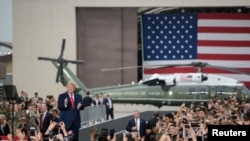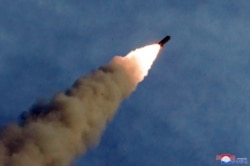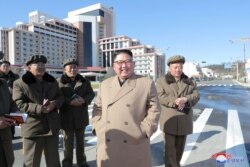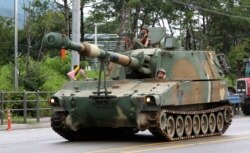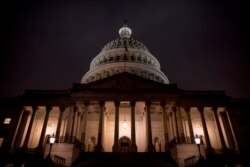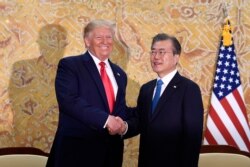Washington's call for a sharp increase in Seoul's share of its defense costs is an untimely demand that could put the readiness of the combined U.S. and South Korean forces at risk at a time when North Korea is escalating threats, said experts.
"This is the worst time to be having this debate between the U.S. and South Korea, given what North Korea has done," said Lawrence Korb, former assistant secretary of defense during the Reagan administration and currently a senior fellow at the Center for American Progress.
Washington and Seoul are engaged in a dispute over the cost-sharing deal set to expire at the end of the year. The fourth round of negotiations on the deal broke down last week in Washington.
Washington has been asking Seoul to pay $5 billion next year for keeping about 28,500 American troops stationed in South Korea. Seoul currently pays $900 million.
As the differences over the Special Measures Agreement (SMA) remain unsettled and the expiration of the current deal draws closer, North Korea has been ramping up pressure on the Korean Peninsula.
On Saturday, North Korea tested what South Korean Defense Minister Jeong Kyeong-doo called a rocket engine that weapons experts are concerned could be used to test a long-range missile. North Korea tested intercontinental ballistic missiles (ICBMs) in 2017 but stopped the tests once it entered diplomatic talks with the U.S. in 2018.
Since May, North Korea has conducted 13 rounds of short- and medium-range missile tests in what is widely seen as an attempt to pressure the U.S. into providing sanctions relief.
Pyongyang has been issuing a succession of warnings to Washington, saying it has until the end of the year to meet its demands.
North Korea has been looking for concessions from the U.S. since the failed Hanoi summit in February. There, the U.S. denied North Korea's demand to relax sanctions and continued to ask for full denuclearization.
With the launches and threats, Pyongyang seems to be suggesting that it will be forced to seek "a new way" if the U.S. does not change its course. North Korea warned the U.S. in April that it would face "undesirable consequences" if it fails to alter its stance.
Robert Manning, a senior fellow at the Atlantic Council, said the U.S. demand for the increase in Seoul's share of the defense cost "could not come at a worse time as North Korea is ratcheting up tensions, appears on the verge of ending denuclearization diplomacy, and may soon launch a new ICBM."
He added the dispute over cost-sharing "emboldens Kim Jong Un," the North Korean leader.
Experts said the expiration of the current SMA could put the readiness of the U.S. and South Korean combined forces at risk.
"A large number of U.S. military personnel will have to be diverted from their normal work," such as training to maintain readiness, according to David Maxwell, a former U.S. Special Forces colonel who served on the Combined Forces Command of the U.S. and South Korea.
Instead of serving their key military functions, American troops would need to fill in the roles of Korean civilian workers who provide administrative and support duties, said Maxwell, who is now a senior fellow at the Foundation for Defense of Democracies.
"If there is no agreement on burden-sharing, then beginning around March or April, the Korean civilian workers will be furloughed," said Maxwell.
Ken Gause, director of the adversary analytics program at research organization CNA, said, "For now, we can accommodate tension and disagreement in the alliance." He continued, "But over time, it will impact readiness and our ability to effectively respond to crises on the peninsula."
Maxwell said the cost-sharing dispute sends a wrong message to North Korea, giving Kim an opportunity to exploit the rift to further "divide the [South Korea]-U.S. alliance to conquer [South Korea]," which has been a goal of Pyongyang's.
"Our actions are contributing to alliance erosion," said Maxwell. "The alliance needs to focus on the threat from the North, which is an existential threat to [South Korea], and it is a vital U.S. national interest to prevent conflict or war on the Korean Peninsula."
Korb said Washington needs to ask Seoul to shoulder a smaller share.
"While it's not insignificant, the fact of the matter is our defense budget is $750 billion," said Korb. "And what you're talking about here is a couple of billion [from Seoul]. Basically, you could settle for a much smaller amount that would make everybody happy."
On Monday, U.S. lawmakers reached an agreement on a $738 billion defense bill and Congress is expected to pass the National Defense Authorization Act this month.
Manning says the U.S. "should drop" its demand that Seoul pay the sharply higher amount and "propose a more sensible formula." He believes the two allies should "also return to a three- or five-year basis for renewing the agreement," rather than the annual renewal now in effect.
The U.S. and South Korea renewed the cost-sharing pact every five years since 1991 until 2018, when U.S. President Donald Trump began increasing Seoul's share of the cost on an annual basis.
Michael O'Hanlon, research director at the Brookings Institution, said, "A fivefold increase is not viable at any time."
Bruce Klingner, a former CIA deputy division chief for Korea and current senior research fellow for northeast Asia at the Heritage Foundation, thinks the U.S. demand that Seoul pay $5 billion is "exorbitant" and overlooks interests and values of the alliance.
He said, "Trump's actions undercut his administration's strong advocacy of the importance of alliances contained in the National Security and National Defense strategies."
Klingner continued, "Risking the alliance over reimbursement costs is counterproductive to U.S. national interest."
The Trump administration dismissed the concern, saying the alliance with Seoul remains “strong and vital.”
"The U.S.-Republic of Korea alliance is strong and vital for regional peace and stability," a U.S. Department of State spokesperson told VOA on background. "We appreciate the considerable resources the Republic of Korea provides to the U.S.-ROK alliance, including but not limited to the Korea Special Measures Agreement, but the president has been clear that the Republic of Korea can and should contribute more of its fair share.
"The United States invests significant military resources and capabilities to meet our defense treaty obligations around the world," the spokesperson continued. "Satisfying these obligations comes with enormous costs. Sustaining the costs of our global military presence is not a burden that should fall on the U.S. taxpayer alone, but is a responsibility that should be shared fairly with allies and partners who benefit from our presence.
"The United States seeks a fair and equitable outcome to the SMA negotiations for both countries that will strengthen and sustain the resilient U.S.-ROK alliance," the spokesperson added.
Tied to the cost-sharing dispute was a concern about whether the U.S. would withdraw American troops from the Korean Peninsula if an agreement is not made.
Secretary of Defense Mark Esper dispelled that concern in November, saying the U.S. has no plans to pull U.S. troops from South Korea.
The defense bill announced on Monday bars the U.S. from cutting the number of American troops in South Korea below 28,500 unless the secretary of defense certifies it is in the U.S. national security interest to do so.
Ham Ji-ha contributed to this report.




